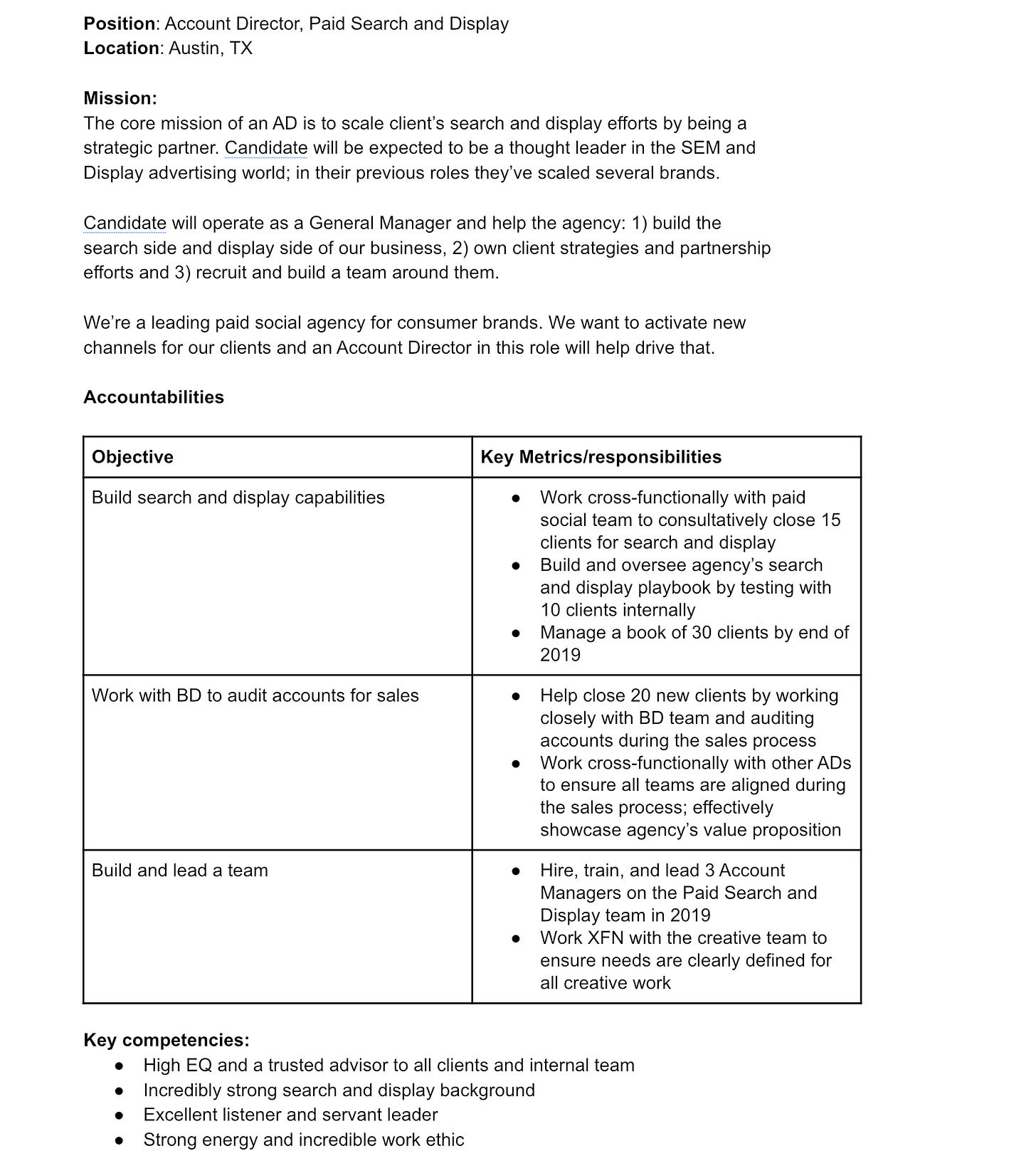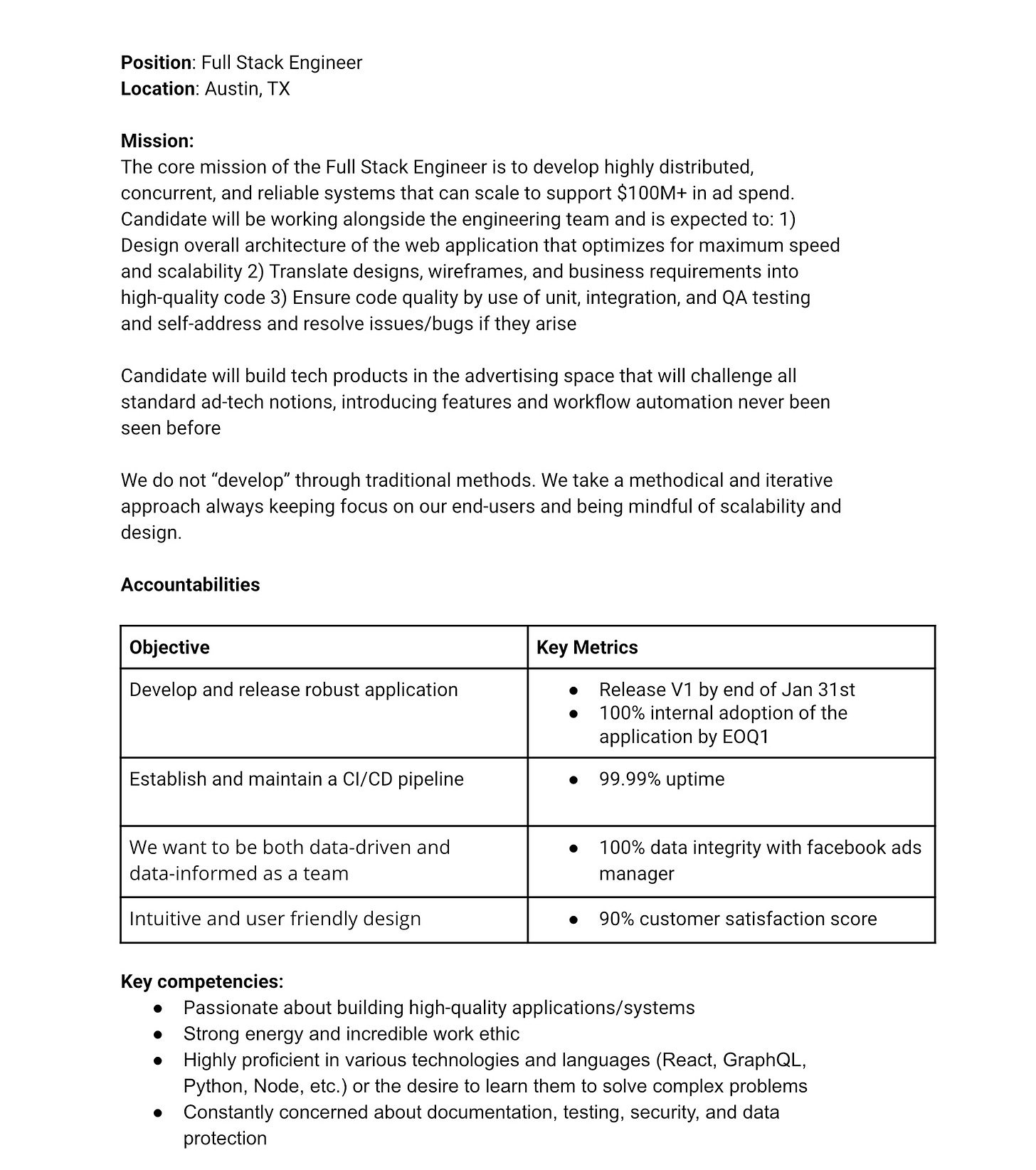I joined Facebook (FB) when the company had less than ~8k people across the globe. When I left, it had 17k+. It was by no means a small company when I joined, but it certainly grew quickly during a short time span. I remember checking my status on my last day and I was there longer than 92% of the company. It felt like a rocket ship. I joined my team as the 17th hire in North America. When I left, we had 400+ people on our team across multiple offices. I helped with recruiting on the SMB team. I left FB at the end of 2016 to start SocialWithin (SW), a performance marketing agency for consumer brands. SW grew from me and myself working in a 1-bedroom apartment to 35 people at it’s peak within 20 months. We occupied the largest office space our landlord had to offer in our building at the time.
Over the last 10 years, I’ve interviewed 1,000+ people across various companies and different parts of organizations. Below are some notes and key learnings that are worth sharing.
1. Hire at the right time
2. Hire for experience and skill
3. Share expectations and scorecard when presenting an offer
4. Know the “B” players when recruiting
5. Understanding compensation
Hire at the right time
I’ve made mistakes here.
Too early
I’ve hired people too early; roles aren’t clearly defined, scorecard isn’t fully built, P&L doesn’t yet justify the hires, and so on. I made the hire because I thought the candidate’s raw talent and abilities would help the organization. That they would find their way around and contribute meaningfully… somehow.
Hiring must start with timing. You have to hire when there’s a business need. This is especially true for smaller businesses, startups, and folks that are bootstrapping. Hiring can be expensive both in terms of time and resources.
Too late
I’ve also hired people too late. When the team is feeling pinched, overwhelmed with inflow of work, and so on. When I hired new people, we expected them to hit the ground running. Onboarding and training was cut short and processes ill-defined. Good people operating in a bad process will lead to chaos. That leads to three things: 1) they leave voluntarily, 2) the leave involuntarily due to performance issues, 3) they stick around and perform below your expectations.
Timing is key when you’re hiring talent.
Hire for experience and skill
Every organization has a layer individual contributors (IC), managers and executives. These are three distinct layers that require different types of experience and skills. And as a result, different recruiting strategies.
When recruiting for IC roles, be sure to identify experience level and set your expectations accordingly. IC 1 (new graduate with less than 2 years of working experience) will operate very differently than IC 4 (with 6-8+ years of experience). This is not only reflective of their compensation, but also scorecard and expectations you’ll have and how they contribute within your organization.
Management recruiting
Managers and executives are the most important and difficult to recruit for. They have to manage up, down and across the organization. They should have some technical competency in the role, so they can effectively manage ICs on their team. They have to have strong leadership and management skills. They have to be able to forecast, etc. I highly recommend hiring people that have previous management experience in your relevant sector. Too often companies promote their best sales rep to be a sales manager; their best engineer to become an engineering manager. Best ICs don’t always make the best managers.
Best managers and executives are technically competent, resourceful, empathetic, solutions-oriented, and possess high EQ. Look for these traits when hiring for your team.
If you’re promoting from within your company, then create time to train the new manager. Time invested now will pay dividends in the future.
Management should be an alternative career path in companies and not the only path as people are growing within their org. Enable the best ICs to do what they do best.
Executive hiring
Executive hiring can take 6-12 months. It’s a long process that requires patience. Play offense when hiring an exec. Startups hire execs when they’re already feeling pinched; often leading to a rushed decision. Also, if you’re an early stage company, don’t overcompensate the title. This happens far too often. Directors are not VPs and VPs are not C-suite. You’re not setting your managers and executives up for success when you give a big title. Rather focus the energy on things like scorecard. Allow them to grow into the title that they want versus providing it for the sake of.
Speaking of titles, avoid “Head of” titles. It’s a vague title and doesn’t scale as the org grows. Companies often give “head of” titles to compensate for salary delta (pay cut) with aims to up-level middle managers otherwise. When you’re growing faster than expected and need to hire a VP for this team, this person will be confused because they were supposed to be “head of.” Use traditional titles like senior manager, director, etc.
The best execs are ones with relevant experience in your sector. This sounds trivial, but it’s important. Hiring a VP from a publicly traded company for your seed stage startup will lead to complications. This candidate, for all intent and purposes, is extremely qualified. They are operators that need people, process, tools to be dialed in already. They will do their best work when systems are in-place because they can be relentless about efficiency. Problem is that you need someone to help you build those systems and processes, hire those people and select those tools. Above all, you need someone who knows how to operate with limited resources and shoestring budgets. You’re much better off hiring someone that has relevant executive experience working at a smaller company than a larger one.
Share expectations when extending an offer
Interview process reveals less than 20% of a candidates ability to do the job.
To prevent surprises, I recommend sharing expectations and key competencies when extending an offer. Most candidates that are qualified and top notch deeply appreciate this. They start to mentally prepare for the road ahead as they’re getting ready to join you.
This step also prevents you from making a costly mistake if the candidate is ultimately not the right fit or was just recruiting for the sake of…
Below are two examples we’ve used in the past at SW for two different roles. I normally interviewed candidates in the final round and I’ve even shared the scorecards in advance of final rounds to make it clear what I’m looking for. Be an open book. Given candidates the leverage. And then ask pointed questions to help gauge whether or not they’re the right fit.


Identify “B” Players
Advice to companies: Every team has a subset of A, B and C players. A and C players know who they are. They know the value they’re creating and why they’re in the company. B players are the hardest to manage, tough to work with and difficult to spot. Oftentimes, B players think they’re As, but sometimes operate like B and C. Do your best to identify what type of player the candidate can be. Everyone wants to hire an A player for every role across the company. And of course, everyone is technically considered an A player during the first month on the job. But it should become clear after the first few weeks what type of candidate you’ve recruited.
Advice to candidates: You’re an A player. You should interview like an A player. When you take the role, you should work hard and deliver value like an A player. But as time goes on and you observe that the value you’re bringing is B or C, then reflect on why that’s happening. Self-awareness is key. In a remote-first world that’s ahead of us, it’ll be easy to hide behind a screen. Don’t let this happen. Try to understand why you’re unable to deliver at your level of expectation. Is it your team? Is it support from your manager? Is it lack of systems/processes, etc.? Perhaps it’s all of the above. But before looking outward, I recommend looking inward.
If the issues you’re identifying are fixable, then take initiative and help the company solve it.
Recognize the following: “A players” are not born. They’re built. An A player has to be a team player, solve hard problems, take initiative, be empathetic, and so on. B and C players sit back and let others fix the issues and simply chatter behind the scenes on lack of support provided to them. A players do the opposite. They solve problems.
Understanding Compensation
Compensation is a mixed bag of goods. It’s inclusive of factors ranging from: salary, benefits, title, growth/learning opportunity and your ability to contribute meaningfully.
Advice to companies: pay fair salary, give the appropriate title, lay out expectations in advance to help the candidate win.
Advice to candidates: recognize that salary is part of the package, not the full package. Focus on all parts of the opportunity, not just the money.
Earlier in your career, I encourage people to pursue the opportunity, not just the money. Don’t sacrifice the salary and benefits, per se. But prioritize the growth and learning opportunity. When I was first getting started, I worked for free for startups. I turned down internships at larger companies that paid well above expected salary to take an unpaid internship to work for a founder that I could learn something from and have an opportunity to contribute meaningfully to their business. I still have a good relationship with those founders after 12+ years. At the time, it felt like an irrational decision to my family and friends, but in hindsight, I wouldn’t trade that experience for any amount of money.
I hope these notes are helpful. This will likely end up being a working doc/post.
This is very insightful. Thank you for sharing your expertise in this subject.